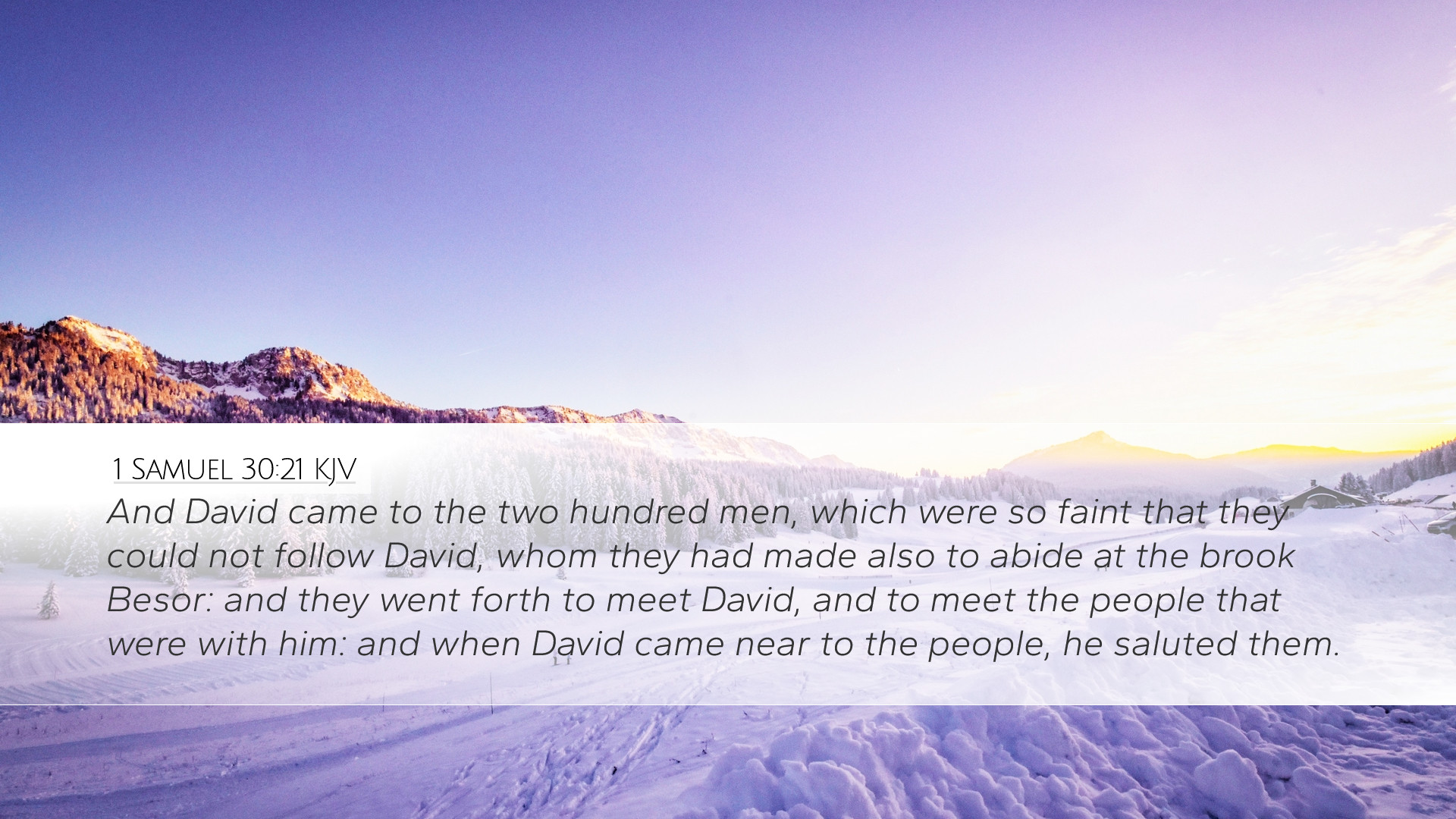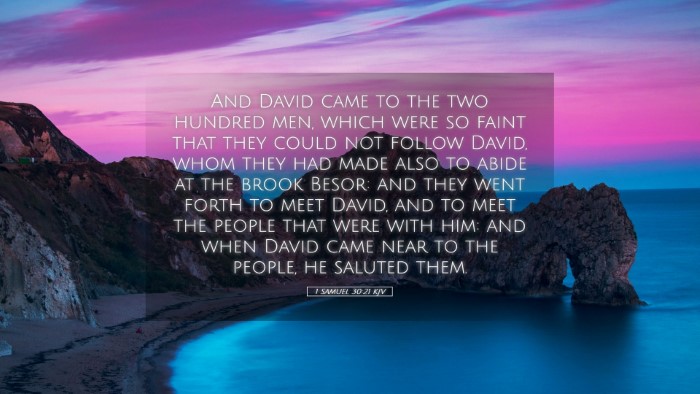Bible Commentary on 1 Samuel 30:21
Verse Context: The verse reads: “And David came to the two hundred men, which were so faint that they could not follow David, whom they had made also to abide at the brook Besor; and they went forth to meet David, and to meet the people that were with him: and when David came near to the people, he saluted them.” (1 Samuel 30:21 KJV)
This passage is a critical moment in David's narrative, marking both a physical and emotional turning point for him and his men after a significant battle against the Amalekites. Understanding this verse requires a combination of historical context, character analysis, and theological reflection.
Historical Context
The backdrop of this chapter chronicles the distressing plight of David and his men who have returned to Ziklag after a campaign only to find their families and possessions taken captive by the Amalekites. Previous to this, David’s behavior while in Philistine territory had been complex, as he sought refuge among the enemies of Israel. The traumatic events lead to deep grief and moral challenges among his followers.
Commentary Insights
Matthew Henry's Commentary
Matthew Henry notes the vital importance of the bond between David and his men. He elaborates on how David, despite being the anointed king, displays compassion and leadership. The verse emphasizes David's recognition of those who were too exhausted to pursue after an arduous conflict.
- Henry highlights David's approach as both merciful and just, arguing that true leadership is demonstrated through care for those who cannot keep pace.
- Additionally, he reflects on the unity within the team, where David's actions foster a spirit of camaraderie and mutual respect among his followers.
Albert Barnes' Notes
Albert Barnes provides a theological reflection on the mercy shown by David. He points out that the two hundred men left behind signify the understanding that not all are equally equipped to fight in all battles, mirroring God’s grace, which accommodates our weaknesses.
- Barnes emphasizes the message of inclusion and support, which is essential for the community of believers, encouraging leaders to recognize and assist those who cannot always advance with the group.
- Moreover, he reflects on the psychological and spiritual implications of this moment, as it portrays the idea of fellowship among believers, where each individual’s burdens and limitations are acknowledged.
Adam Clarke's Commentary
Adam Clarke explores the significance of the brook Besor as more than just a geographical spot; it represents a place of rest and reflection. Clarke posits that the brook symbolizes the thresholds in our spiritual journey, where we must sometimes pause and regroup.
- Clarke mentions the folly of the men who would have left these weary ones behind, suggesting that this act of abandoning those in need reflects a lack of commitment to the broader community.
- He encourages deeper reading into David’s response, seeing it as a model for pastoral care, highlighting that leaders should always strive to encompass those who feel overwhelmed and exhausted.
Theological Implications
This verse encapsulates key theological themes: grace, community, and reconciliation. It invites leaders within the church to reflect on their responsibilities toward congregants who may find themselves sidelined.
- Grace: David’s interaction with the two hundred signifies the grace of God, where individuals, regardless of their physical or spiritual state, are welcomed and valued.
- Community: This passage underscores the importance of community, reminding pastors and church leaders that their calling involves shepherding those who are weak and restoring them.
- Reconciliation: It exemplifies the power of reconciliation, as David chooses to embrace and salute his men, acknowledging their struggle while also affirming their worth.
Lessons for Modern Leadership
For pastors and church leaders, several lessons come from 1 Samuel 30:21:
- Awareness of Needs: Leaders must remain sensitive to the varying capacities of their members and recognize when to provide support.
- Fostering Inclusivity: The importance of fostering a culture where every member feels valued regardless of their current circumstances is vital.
- Encouragement of Restoration: Church leaders should constantly seek to restore and uplift those who are weary, reflecting Christ’s love and compassion.
- Building Community: This passage reveals that true community is built through mutual support during times of adversity.
Conclusion
1 Samuel 30:21 serves not only as a narrative of David's leadership but also as a profound teaching on how to navigate communal crises with grace and compassion. The insights drawn from public domain commentators remind us of our responsibilities as leaders in embodying the same mercy and love that David exhibited. This verse challenges us to rigorously assess how we engage with those within our communities and to constantly strive for inclusivity, support, and restoration.


